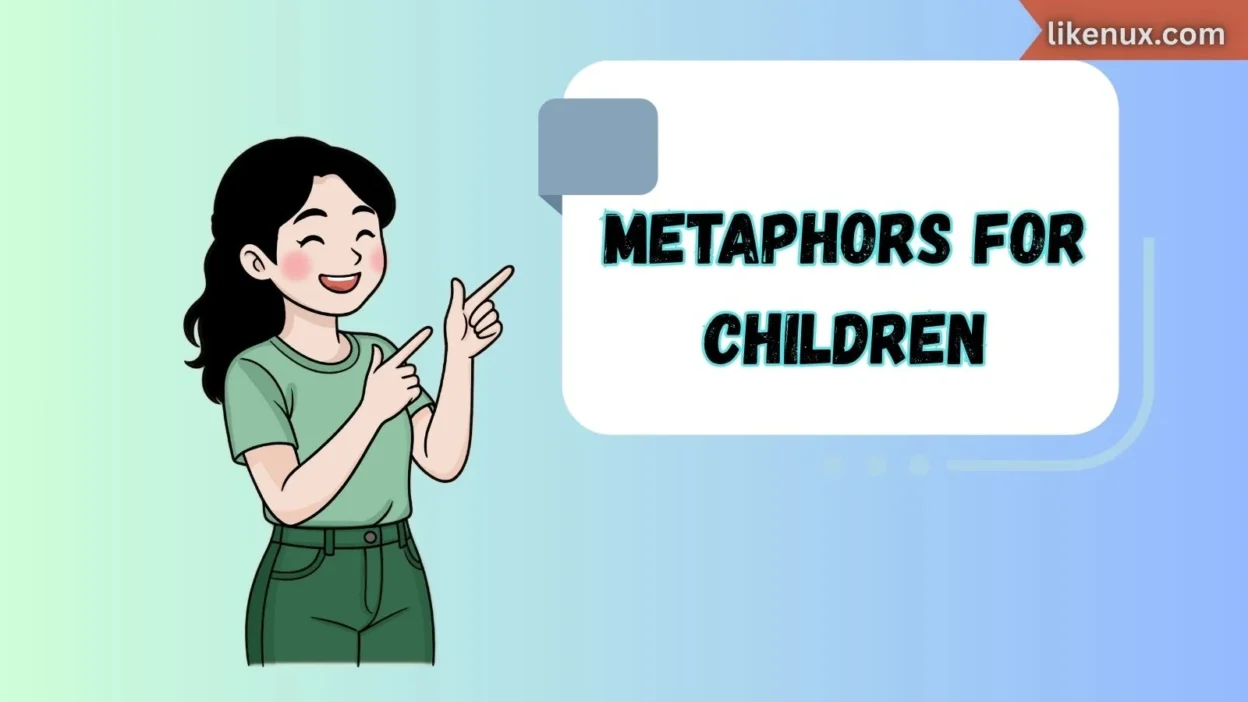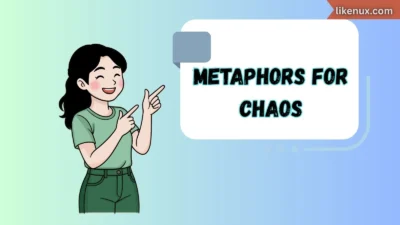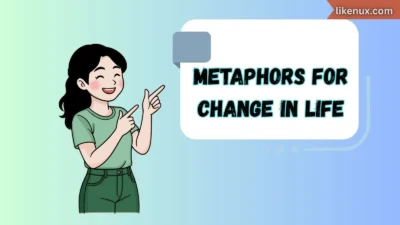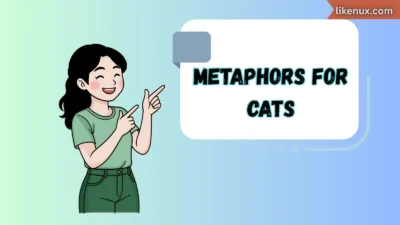Children are tiny sparks of wonder that light up every corner of our world. Their laughter, questions, and curiosity remind us what it means to truly live in the moment. Finding the right words to describe them can be magical — and that’s where Metaphors for Children help.
In this article, we’ll explore 25 warm, thoughtful, and expressive metaphors you can use to describe children with love, care, and a touch of creativity. As someone who has spent years around children — from guiding little learners to watching my own nieces grow — I’ve learned that every child is a story, a universe of their own.
Let’s uncover these metaphors together — each one crafted with meaning, heart, and authenticity.
1. Children are sunshine
Meaning: They bring warmth, happiness, and brightness wherever they go.
In a sentence: Her little boy was the sunshine that melted everyone’s worries away.
Best use: Use this metaphor to express how a child lights up your life.
Other ways to say: Children are rays of light, beams of joy, or warm glows.
2. Children are seeds
Meaning: They hold endless potential waiting to grow.
In a sentence: Every child is a seed that needs care and nurturing to bloom.
Best use: Use it when talking about education, growth, or parenting.
Other ways to say: Young sprouts, tender roots, budding dreams.
3. Children are blank pages
Meaning: Their lives are unwritten stories waiting to be filled.
In a sentence: Each child is a blank page, ready to be written with love and learning.
Best use: In teaching or parenting reflections.
Other ways to say: Unwritten stories, open books, fresh slates.
4. Children are mirrors
Meaning: They reflect the world and people around them.
In a sentence: Children are mirrors; they show what they see at home and in society.
Best use: In discussions about role modeling or environment.
Other ways to say: Reflections, echoes of love, small imitators.
5. Children are stars
Meaning: Each child shines in their own special way.
In a sentence: Every child is a star, brightening the sky of our lives.
Best use: To celebrate individuality.
Other ways to say: Gleaming lights, tiny constellations, bright gems.
6. Children are explorers
Meaning: They are always curious, seeking to discover the world.
In a sentence: Children are explorers, always reaching for the unknown.
Best use: When describing curiosity or learning.
Other ways to say: Adventurers, wanderers, little discoverers.
7. Children are sponges
Meaning: They absorb knowledge and emotions quickly.
In a sentence: Children are sponges, soaking up everything they see and hear.
Best use: In educational or developmental contexts.
Other ways to say: Quick learners, absorbent minds, eager observers.
8. Children are butterflies
Meaning: They are beautiful, delicate, and ever-changing.
In a sentence: Children are butterflies, fluttering through stages of growth and wonder.
Best use: For poetic or emotional descriptions.
Other ways to say: Gentle spirits, colorful wings, fleeting wonders.
9. Children are treasures
Meaning: They are precious and valuable beyond measure.
In a sentence: Our children are treasures we must guard with love and care.
Best use: In family or parenting writing.
Other ways to say: Gems, gifts, priceless hearts.
10. Children are dreams made real
Meaning: They embody hope, imagination, and future possibilities.
In a sentence: Every child is a dream made real — a living vision of tomorrow.
Best use: In emotional or reflective writing.
Other ways to say: Living hopes, dreams in motion, walking wonders.
11. Children are clay
Meaning: They can be shaped by experiences and guidance.
In a sentence: Children are clay, molded by the hands that guide them.
Best use: In parenting or teaching advice.
Other ways to say: Malleable minds, soft beginnings, forming hearts.
12. Children are music
Meaning: They bring rhythm, joy, and melody to life.
In a sentence: Children are music — every laugh a note, every smile a song.
Best use: In creative or emotional expressions.
Other ways to say: Songs of life, joyful tunes, living symphonies.
13. Children are roots of the future
Meaning: They connect today to tomorrow.
In a sentence: Children are the roots that keep the future growing strong.
Best use: In motivational or social contexts.
Other ways to say: Seeds of tomorrow, young foundations, pillars of the future.
14. Children are artists
Meaning: They see the world with imagination and creativity.
In a sentence: Children are artists, painting life with endless colors of curiosity.
Best use: In discussions about creativity.
Other ways to say: Dream painters, little creators, young visionaries.
15. Children are waves
Meaning: They bring movement, energy, and constant change.
In a sentence: Children are waves, reshaping the shores of our hearts.
Best use: In poetic writing or life reflections.
Other ways to say: Tides of joy, ripples of growth, flows of innocence.
16. Children are angels
Meaning: They are pure, innocent, and full of grace.
In a sentence: Children are angels sent to remind us of kindness and love.
Best use: In heartfelt or spiritual writing.
Other ways to say: Heaven’s messengers, pure souls, gentle blessings.
17. Children are candles
Meaning: They light the darkness with their innocence and hope.
In a sentence: Children are candles, flickering softly in the winds of life.
Best use: In reflective essays or emotional pieces.
Other ways to say: Beacons, guiding lights, warm glows.
18. Children are stories
Meaning: Each has a unique journey and lesson to share.
In a sentence: Children are stories still being written with love and learning.
Best use: In educational or family writing.
Other ways to say: Living tales, unfolding chapters, whispered dreams.
19. Children are rainbows
Meaning: They bring color after life’s storms.
In a sentence: Children are rainbows — a promise of joy after the rain.
Best use: In poetic or emotional expressions.
Other ways to say: Colorful blessings, symbols of hope, bright arcs.
20. Children are gardeners of joy
Meaning: They plant happiness wherever they go.
In a sentence: Children are gardeners of joy, spreading laughter like seeds.
Best use: In emotional, reflective, or parenting contexts.
Other ways to say: Happiness planters, joy growers, cheerful cultivators.
21. Children are time travelers
Meaning: They move us between past memories and future dreams.
In a sentence: Children are time travelers — reminders of where we came from and where we’re going.
Best use: In nostalgic or reflective writing.
Other ways to say: Memory keepers, dream voyagers, youthful bridges.
22. Children are painters of tomorrow
Meaning: They create the future with their imagination.
In a sentence: Children are painters of tomorrow, coloring the world with new ideas.
Best use: In education or motivation.
Other ways to say: Future artists, creators of tomorrow, dream builders.
23. Children are tiny teachers
Meaning: They teach us patience, love, and presence.
In a sentence: Children are tiny teachers who remind us to slow down and notice life’s details.
Best use: In reflective or parenting articles.
Other ways to say: Little mentors, quiet guides, innocent instructors.
24. Children are laughter in motion
Meaning: Their joy and energy bring life to every space.
In a sentence: Children are laughter in motion, turning ordinary moments into memories.
Best use: In lighthearted or joyful writing.
Other ways to say: Joyful sparks, living smiles, moving happiness.
25. Children are magic
Meaning: They make the world brighter just by existing.
In a sentence: Children are pure magic — proof that life is full of wonder.
Best use: In heartfelt, emotional, or poetic writing.
Other ways to say: Miracles, wonders, living enchantments.
Conclusion
Children remind us of life’s purest truths — love, hope, laughter, and endless curiosity. Through these metaphors, we see not only who they are, but who we become when we see the world through their eyes.
Whether you’re a teacher, parent, or writer, use these metaphors to express the wonder of childhood with sincerity and care. Because describing children isn’t just about words — it’s about feeling their light.
FAQs
1. Why are metaphors important when describing children?
Metaphors add emotional depth and beauty, helping express how children make life meaningful.
2. Can teachers use these metaphors in classrooms?
Absolutely! They can make lessons more engaging and language-rich.
3. Which metaphor is best for describing curiosity?
“Children are explorers” or “Children are sponges” both capture that spirit perfectly.
4. How can parents use these metaphors in daily life?
Parents can use them in notes, bedtime stories, or even when expressing gratitude for their children.
5. Are these metaphors suitable for writing essays or books?
Yes — these are crafted to sound natural, emotional, and professional, perfect for writing or speaking contexts.

Daniel Matthew is a passionate visionary who believes in creativity, purpose, and innovation. With a focus on growth and authenticity, he turns every idea into meaningful impact.



